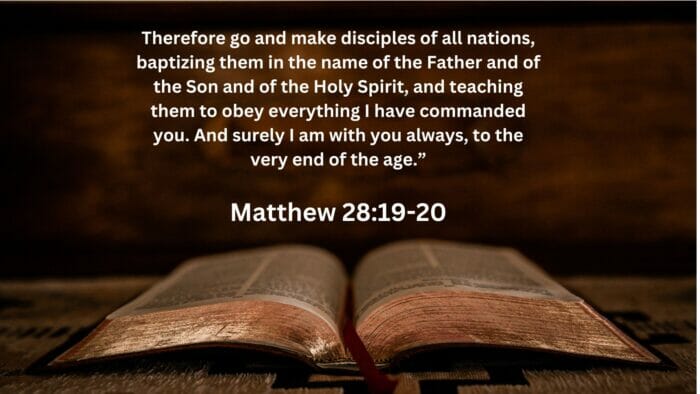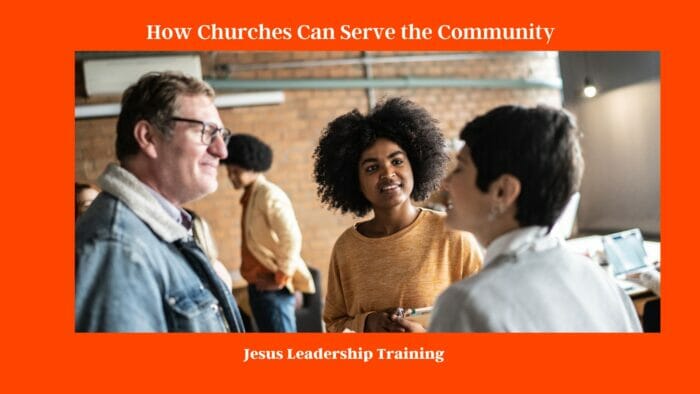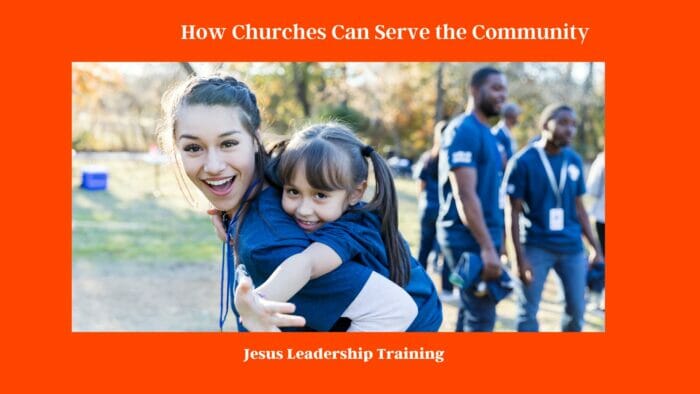How Churches Can Serve the Community – Discover the numerous ways churches can serve the community and make a positive impact. This comprehensive guide explores 25 engaging ways that churches can contribute to their local communities, fostering a sense of unity and support.
Learn how churches can serve the community through various outreach programs, volunteering efforts, and compassionate initiatives that address the needs of the people they serve.
In today’s fast-paced and interconnected world, community support and unity are more critical than ever. Churches have long been at the forefront of providing assistance, guidance, and compassion to their communities.

They play a significant role in nurturing the well-being of their members and those beyond their congregation. In this article, we will explore a plethora of ways that churches can serve the community, bringing people together and making a positive impact on society. Let’s delve into these 25 engaging ways and discover how churches can be a beacon of hope and support for their neighborhoods.
Table of Contents
How Churches Can Serve the Community
- Establishing Food Pantries and Soup Kitchens Churches can start and run food pantries and soup kitchens to provide nourishing meals to individuals and families facing food insecurity. These initiatives offer a lifeline to those in need, ensuring that nobody in the community goes hungry.
- Offering Clothing and Essentials Drives Hosting clothing drives allows churches to collect clothes, blankets, and essential items to distribute to the less fortunate during challenging times or seasonal changes.
- Organizing Community Clean-up Events By initiating community clean-up events, churches can come together with local residents to beautify neighborhoods, parks, and public spaces, fostering a sense of pride and care for the environment.
- Providing Shelter for the Homeless Churches can collaborate with homeless shelters or even open their facilities to provide a safe place for individuals experiencing homelessness.
- Running Support Groups and Counseling Services Establishing support groups and counseling services within the church premises can offer emotional and mental health support to community members facing various challenges.
- Educational Assistance and Tutoring Programs Churches can assist students by offering tutoring programs, scholarships, or after-school activities that nurture academic growth.
- Promoting Health and Wellness Initiatives Hosting health fairs, workshops, and awareness campaigns on topics like nutrition, fitness, and mental health can improve the overall well-being of the community.
- Supporting Single Parents and Families Churches can create networks of support for single parents and families, providing resources and assistance in times of need.
- Engaging in Environmental Stewardship Churches can lead by example and inspire eco-friendly practices within their congregation and the broader community.
- Providing Financial Literacy Programs Offering workshops on financial management and budgeting can empower community members to achieve financial stability.
- Serving as Disaster Relief Centers During times of natural disasters or emergencies, churches can serve as relief centers, providing aid, shelter, and support to affected individuals.
- Caring for the Elderly and Vulnerable Initiatives like home visits and companionship programs can make a significant difference in the lives of the elderly and vulnerable members of the community.
- Promoting Racial and Social Equality Churches can actively advocate for racial and social justice, fostering an inclusive and equitable community.
- Partnering with Local Schools and Nonprofits Collaborating with educational institutions and other nonprofits amplifies the positive impact churches can have on the community.
- Supporting Foster Families and Children Churches can offer support to foster families and children through mentorship programs and resource assistance.
- Organizing Charity Events and Fundraisers Hosting charity events and fundraisers can raise funds for various community projects and initiatives.
- Offering Legal Aid and Assistance Providing legal aid clinics or connecting community members with pro bono legal services helps address legal challenges.
- Encouraging Volunteerism Churches can inspire their congregation to actively volunteer in community service projects, fostering a culture of giving back.
- Promoting Family and Marriage Counseling Offering family and marriage counseling services helps strengthen familial bonds and relationships.
- Creating Opportunities for Skill Development Organizing workshops and vocational training programs empowers community members with valuable skills.
- Supporting Local Businesses and Entrepreneurs Churches can promote and support local businesses to stimulate economic growth within the community.
- Addressing Substance Abuse and Addiction Providing resources and support for individuals struggling with substance abuse helps in fostering a healthier community.
- Promoting Interfaith Dialogue and Understanding Churches can play a crucial role in promoting interfaith dialogue and understanding, fostering religious harmony.
- Running Children’s Programs and Activities Organizing children’s programs and activities creates a nurturing and supportive environment for the youth.
- Advocating for Affordable Housing Churches can advocate for affordable housing initiatives to address homelessness and housing challenges in the community.
Encourage Church Community Involvement
| Action | Description |
|---|---|
| 1. Communicate the Importance of Community Service | Explicitly teaching about the biblical basis for service and its importance in the Christian life can inspire church members to get involved. Use scriptures, sermons, and Bible study discussions to emphasize the value of serving others. |
| 2. Incorporate Service into Church Activities | Church events and activities can include service elements. This not only aids the community but also gives church members a hands-on experience of the value and impact of their work. |
| 3. Provide a Variety of Opportunities | Different people are drawn to different types of service. Providing a variety of opportunities, from working with children to serving meals to the homeless, can help engage a broader range of church members. |
| 4. Encourage Small Groups to Serve Together | Small groups or Bible study groups within the church can take on service projects as a way to build community within the group and make a difference in the wider community. |
| 5. Recognize and Celebrate Service | Regularly acknowledging and celebrating those who serve can encourage more people to get involved. This could be done through announcements, newsletters, or special events. |
| 6. Lead by Example | Leaders of the church can model the importance of service by participating in community service activities themselves. This shows that service is a priority at all levels of the church. |
| 7. Partner with Local Organizations | By building relationships with local non-profits or community organizations, the church can provide members with trusted, meaningful opportunities to serve. |
| 8. Make it Easy to Get Involved | The easier it is to start serving, the more likely people are to do it. Clear communication about how and when to show up, what to expect, and who to contact with questions can remove barriers to participation. |
| 9. Foster a Culture of Service | Encouraging a church culture that values and prioritizes service can be a powerful motivator. This can be done through preaching, teaching, and the practices and attitudes of church leaders. |
| 10. Use Testimonies and Stories | Hearing personal stories of how service has impacted both those serving and those served can inspire others to get involved. This can be done through video testimonies, interviews, or written stories. |
Community Events
| Action | Description |
|---|---|
| 1. Participate in Community Events | Seek opportunities for the church to have a presence at community events. This could mean setting up a booth, volunteering, sponsoring a part of the event, or providing resources. |
| 2. Co-Host Community Events | Partner with local organizations or groups to co-host events. This can show the church’s commitment to the community and create opportunities for relationship-building. |
| 3. Publicize Community Events | Use the church’s communication channels, such as newsletters, social media, and announcements, to publicize community events. This can show support for the community and encourage church members to participate. |
| 4. Integrate Community Causes into Church Events | When the church hosts events, integrate local causes. This might mean collecting food for a local food bank at a church dinner, or incorporating a walk or run for a local charity into a church picnic. |
| 5. Create Events that Address Community Needs | Pay attention to the needs of the community and create events that address those needs. This could mean hosting a job fair, a health clinic, or a school supply drive. |
| 6. Incorporate Local Culture into Church Events | Show appreciation for local culture by incorporating it into church events. This could mean showcasing local music or art, or celebrating local holidays or festivals. |
| 7. Involve Community Leaders | Involve local leaders in church events, perhaps by inviting them to speak or present awards. This can strengthen ties between the church and community. |
| 8. Use Church Facilities to Support Community Events | If the church has suitable facilities, consider offering them for community events. This can provide a valuable resource for the community and bring new people into contact with the church. |
| 9. Encourage Church Members to Volunteer for Community Events | Encourage and provide opportunities for church members to volunteer at community events. This can provide meaningful service opportunities and strengthen ties between the church and community. |
| 10. Collaborate with Other Churches for Community Events | Join forces with other churches in the area for community events. This can show unity among local Christians and create a larger impact in the community. |
Services – How Churches can do Outreach at Community Events
| Outreach Method | Description |
|---|---|
| 1. Hosting Information Booths | A church can host an information booth at a community event. This is a non-intrusive way to inform the community about the church’s services, beliefs, and mission. |
| 2. Offering Free Services | At community events, churches could offer free services like face painting, balloon animals, or refreshments. This serves as a practical demonstration of kindness and love to the community. |
| 3. Participating in Community Service | Participating in community service events not only allows churches to give back to the community, but it also helps them demonstrate the values of compassion and selfless service. |
| 4. Collaborating with Other Organizations | Partnering with other organizations during community events can showcase the church’s commitment to community development and inclusivity. |
| 5. Presenting Live Performances | Musical performances, skits, or puppet shows can draw people to the church’s presence in an event. This can also serve as a conversation starter about the church’s values and mission. |
| 6. Distributing Promotional Material | Giving away bookmarks, pens, bracelets, or other items with the church’s logo and information can help increase the church’s visibility in the community. |
| 7. Organizing Activities for Children | Organizing activities for children, such as crafts or games, can create a positive impression on families. This can open doors for further conversations about the church’s programs for children and families. |
| 8. Conducting Surveys or Polls | Conducting surveys or polls about community needs can show the community that the church cares about their opinions and needs. This can also provide valuable information for future outreach efforts. |
| 9. Offering Prayer | If appropriate for the event and the community, offering to pray for people’s needs can be a powerful way to connect with individuals on a deeper level. |
| 10. Giving Away Free Resources | The church can give away free resources like Bibles, devotional books, or pamphlets about the church’s beliefs and services. This can help people learn more about the church and its teachings. |
What is Vision Casting – Proverbs 29:18 says, “Where there is no vision, the people perish
Check this vision – I would follow this – Greg Gaines

How Churches Can Serve the Community: FAQs
Q: How can churches make a positive impact on their communities?
Churches can make a positive impact on their communities by providing a wide range of services and programs. Churches can provide spiritual guidance, offer educational opportunities, host social events, and provide community outreach programs. These programs can include providing food and clothing to those in need, providing job skills training, hosting community health fairs, and providing tutoring services. Churches can also offer support groups and other programs to help members of the community struggling with mental health issues, addiction, poverty, and homelessness.

Q: What are some examples of community outreach programs that churches can undertake?
Churches can undertake a number of community outreach programs, such as offering free meals, providing meals for seniors, hosting free health clinics, running thrift stores with affordable clothing, offering transportation services, providing counseling services, and creating after-school programs for youth. Churches can also provide job skills training, create volunteer opportunities for members of the community, and offer financial assistance for those in need.
Q:How can churches contribute to disaster relief efforts?
Churches can contribute to disaster relief efforts by providing resources to those affected. This may include providing housing, food, clothing, and medical supplies. Churches can also provide emotional and spiritual support to those affected by the disaster and help with the rebuilding process. Churches can also coordinate with other organizations to organize volunteer efforts and fundraising campaigns.

Q: How do churches foster a sense of unity and support within their communities?
Churches can foster a sense of unity and support within their communities by hosting social events, such as potlucks, game nights, and movie nights. Churches can also offer various educational programs, such as classes on spirituality, health, and financial literacy. Churches can also provide support groups for those in the community dealing with mental health issues, addiction, poverty, and homelessness.
Q: What role do churches play in addressing social issues?
Churches play an important role in addressing social issues in their communities. Churches can organize advocacy campaigns to raise awareness of social issues and can provide educational resources about these issues. Churches can also provide volunteer opportunities for members of the community to help address social issues, such as poverty, hunger, and homelessness. Churches can also offer financial assistance and other resources to those affected by social issues.
Q: How can churches collaborate with other organizations to enhance their impact on the community? (Video Tool, Tool Kits, other Graphics Training)
Churches can collaborate with other organizations to enhance their impact on the community. Churches can partner with local schools, non-profits, and other organizations to provide educational resources, job training, and other programs to benefit the community. Churches can also coordinate with other organizations to organize volunteer opportunities and fundraising campaigns to provide assistance to those in need.
Churches can help prepare people spiritually. They can help by supporting local parks by Clean up. They can possibly hold a worship service that would help in leading ideas in outreach.
Best Bible Encyclopedias and Dictionaries
Below is a table featuring some highly regarded Bible Encyclopedias and Dictionaries along with their publishers and websites where they can be found or purchased.
| Title | Publisher | Website |
|---|---|---|
| The International Standard Bible Encyclopedia | Eerdmans | Eerdmans |
| Zondervan’s Pictorial Bible Dictionary | Zondervan | Zondervan |
| Easton’s Bible Dictionary | Thomas Nelson | Thomas Nelson |
| Holman Illustrated Bible Dictionary | B&H Publishing Group | B&H Publishing Group |
| The New Unger’s Bible Dictionary | Moody Publishers | Moody Publishers |
| HarperCollins Bible Dictionary | HarperOne | HarperOne |
| Vine’s Complete Expository Dictionary of Old and New Testament Words | Thomas Nelson | Thomas Nelson |
You can generally find these resources on the publishers’ websites, as well as other online book retailers such as Amazon or Christianbook. It’s always good practice to confirm availability and review additional details on the specific websites or other reliable online bookstores.
Final Thoughts – How Can Churches Serve the Community
Churches have an incredible capacity to serve and uplift their communities in diverse and meaningful ways. By embracing compassion, empathy, and a spirit of giving, they can address the needs and challenges faced by their neighbors, creating a more harmonious and supportive society.
Through food pantries, support groups, educational programs, disaster relief efforts, and much more, churches become beacons of hope, guiding their communities towards a brighter and more promising future.
As you embark on your journey to serve the community through your church, remember that every small effort contributes to significant positive change. Together, we can build a stronger and more compassionate world, one act of service at a time.




